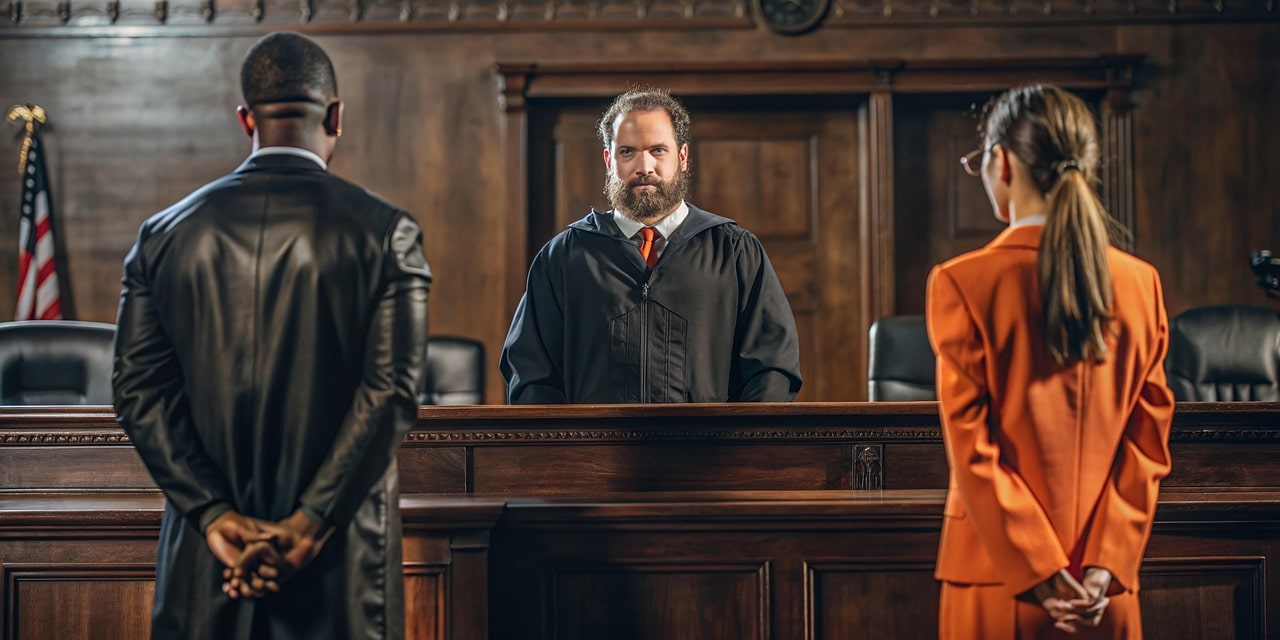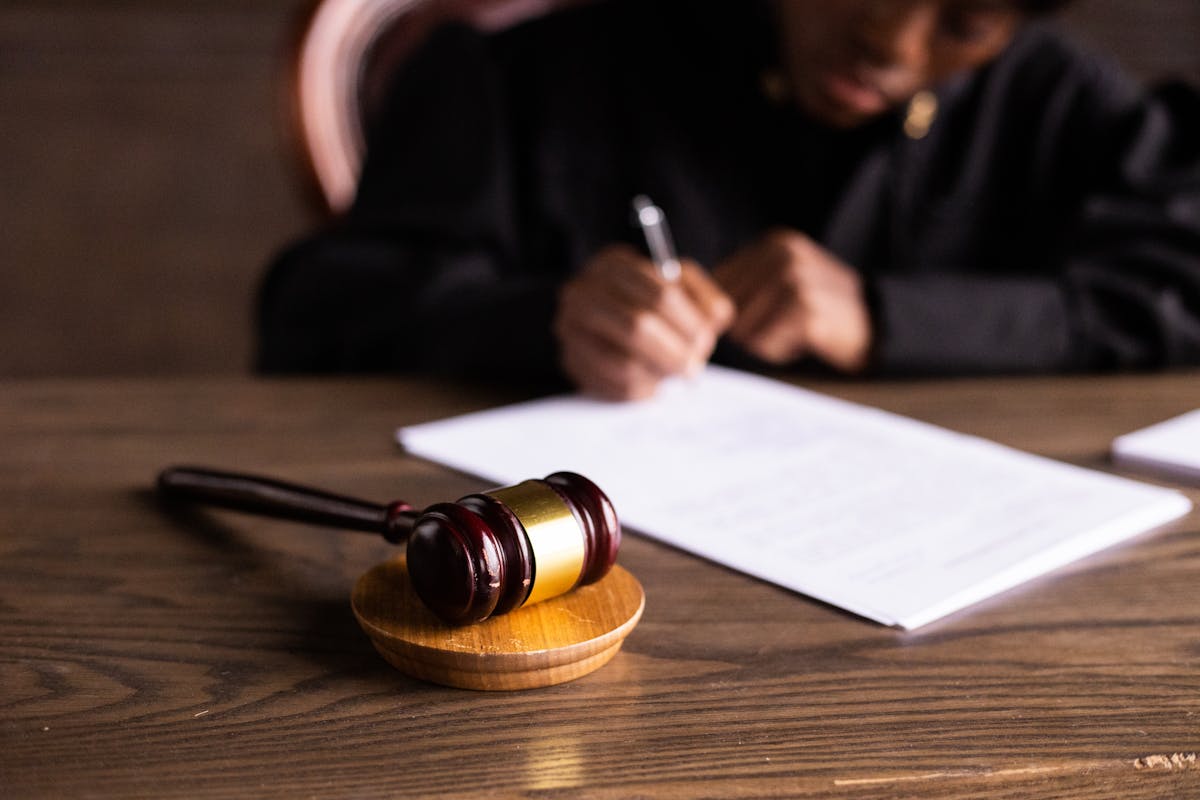
Court trials are a cornerstone of the legal system, offering a structured process to resolve disputes and uphold justice. There are different types of trials, each tailored to the specifics of the case at hand. Among these is the bench trial, a form of litigation that’s distinct in its approach and execution.
When navigating the legal process, understanding the trial type is crucial. Choosing the appropriate format and knowing how the proceedings unfold can significantly impact the outcome of your case.
The bench trial meaning goes deeper than just being a judge-decided case – it represents a focused approach to justice where complex legal matters can be resolved efficiently. Let’s explore what a bench trial is, detailing what they are, how they function, and their common usage.
What Is a Bench Trial?
A bench trial is a legal proceeding where a judge serves as the sole fact-finder who decides both the applicable law and the facts of the case. This bench trial definition highlights its key difference from jury trials.
Unlike a jury trial, which involves a group of peers determining the verdict, a bench trial relies entirely on the judge’s interpretation of evidence and testimony.
To further define bench trial proceedings, we should note that they follow the same basic rules of evidence as jury trials, but with some key procedural differences. Some people mistakenly think that “a jury decides the case in a bench trial”, but this is incorrect – the bench trial verdict comes exclusively from the judge’s deliberation.
So, whats a bench trial and why might it be the preferred option? A bench trial is typically faster and less costly than a jury trial, as it eliminates the need for jury selection and deliberation. It is often used in civil cases, family court matters, and certain criminal cases where both parties waive their right to a jury.
When considering what does bench trial mean for legal strategy, attorneys often recommend this approach for cases involving:
- Complex legal questions
- Technical subject matter
- Situations where emotional appeals might sway a jury
For a bench trial example, consider cases involving intellectual property or contract interpretation – areas where a judge’s specialized knowledge proves invaluable.
When Is Bench Trial Used
A bench trial is often used in cases where legal or factual issues require careful, technical analysis that a judge is better equipped to handle than a jury. Since judges are trained legal professionals, their objectivity and expertise can lead to more precise rulings, especially in disputes involving intricate legal principles or highly specific evidence.
What happens at a bench trial differs from jury trials in several ways. The atmosphere is generally more formal and focused on legal arguments rather than storytelling. What does a bench trial mean for the parties involved? It often means a more predictable process where legal merits outweigh emotional factors.
To better understand what is a bench trial in court settings, let’s examine three real-life cases where this trial format was utilized.
Faretta v. California, 422 U.S. 806 (1975)
This landmark case demonstrated the balance between a defendant’s constitutional rights and the judiciary’s responsibility to ensure fair trials.
In this case, Anthony Pasquall Faretta was charged with grand theft and initially chose to represent himself in court. The judge approved his request but later reconsidered after questioning Faretta about his understanding of courtroom procedures, such as the hearsay rule. Concluding that Faretta lacked the necessary legal knowledge to effectively waive his right to counsel, the judge appointed a public defender to his case.
Faretta was convicted, and his appeals to higher courts were unsuccessful, as they upheld the trial judge’s decision.
A bench trial allowed for a meticulous evaluation of Faretta’s legal capacity and safeguarded the integrity of the judicial process. It illustrates how bench trials are sometimes preferred when the focus is on ensuring procedural fairness over jury dynamics.
Leazenby Construction, Inc. v. City of Council Bluffs
This case involved a contract dispute between Leazenby Construction and the City of Council Bluffs in Iowa.
Leazenby alleged that unforeseen subsurface conditions made it impossible to fulfill the terms of their contract and that the city had wrongfully terminated the agreement. The city counterclaimed, arguing that Leazenby had breached the contract by failing to complete the project on time and leaving the site unsafe.
A bench trial was chosen due to the complex nature of the dispute, which required careful interpretation of contract law and technical evidence. The court reviewed extensive documentation, including project timelines, site conditions, and financial records, to determine which party bore responsibility.
This case highlights how bench trials are ideal for resolving matters involving technicalities or detailed contractual issues, where a judge’s specialized knowledge is invaluable.
Genevieve Williams v. United States of America
In this case, Genevieve Williams filed a claim against the United States under the Federal Tort Claims Act, seeking compensation for injuries sustained in a slip-and-fall incident at a Navy Exchange convenience store in Tennessee. Williams argued that the government was liable for the hazardous condition that caused her fall.
During the bench trial, both parties presented evidence, including security footage and witness testimonies.
Williams’ legal team argued that the store should have known about the spill that caused her injury, while the defense maintained that there was no clear evidence of negligence.
The presiding judge carefully examined the evidence, including photographs and testimonies from the plaintiff and store employees, to reach a decision.
These cases demonstrate what a bench trial is at its core – a focused legal proceeding where judicial expertise guides the outcome. Judges can methodically analyze the facts without the potential biases or emotional influences a jury might introduce.
Bench vs Jury Trial: What’s the Difference

When comparing a bench vs jury trial, the primary distinction lies in who determines the verdict.
In a bench trial, the judge serves as the sole decision-maker, evaluating the evidence, interpreting the law, and delivering a verdict. In contrast, a jury trial involves a group of citizens, selected through a vetting process, who collectively decide the outcome based on the facts presented during the trial.
Another distinction lies in the process and duration. Bench trials are typically quicker and less formal, as they do not require jury selection or deliberation. They also tend to be less costly, as fewer resources are needed to accommodate a jury.
To further define bench trial advantages:
- More predictable rulings based on law rather than emotion
- Faster resolution of cases
- Better for complex legal matters
- Avoids potential jury biases
What does a bench trial mean for your case strategy? It often means focusing on strong legal arguments rather than emotional appeals that might sway a jury.
However, the choice between a bench trial and a jury trial depends on the specifics of the case, the preferences of the parties involved, and the strategy their legal counsel recommends.
Each format has its unique benefits, making it important to choose the right one for your legal situation.
The Bench Trial Process
What happens at a bench trial procedurally? The process is streamlined compared to a jury trial, as it involves only the judge as the decision-maker. Understanding how this process works can help plaintiffs, defendants, and legal teams prepare effectively.
Below is a breakdown of the typical bench trial process.
Pre-Trial Preparations
Before the trial begins, both parties engage in pre-trial activities, such as filing pleadings, conducting discovery, and attending hearings.
Discovery is a critical phase where each side exchanges evidence, including documents, depositions, and witness lists.
Motions may also be filed to resolve procedural or evidentiary issues before the trial starts.
Opening Statements
The bench trial begins with opening statements from both sides. These statements outline the key arguments, facts, and evidence each party will present.
Since the judge will decide the case, opening statements in bench trials are often concise and focus on legal and factual details rather than emotional appeals.
Presentation of Evidence
During this phase, both parties present their evidence and call witnesses to testify. The evidence can include documents, expert reports, physical exhibits, or photographs. Witnesses are examined and cross-examined by the opposing counsel, allowing the judge to evaluate the credibility of their testimony.
Objections and Rulings
Throughout the trial, attorneys may raise objections to evidence or testimony. The judge rules on these objections immediately, ensuring that the trial proceeds without delay.
Since there is no jury, the judge can quickly address procedural or evidentiary issues without extended interruptions.
Closing Arguments
Once all evidence has been presented, both sides deliver closing arguments. These arguments summarize the case, highlight key evidence, and reinforce legal points that support their position.
In a bench trial, closing arguments often emphasize technical legal interpretations, as the judge is familiar with the law.
The Judge’s Decision
After reviewing the evidence and hearing the arguments, the judge renders a decision. This ruling typically includes a detailed explanation of the legal reasoning behind the verdict.
In some cases, the judge may issue a written opinion, especially in complex matters.
Throughout each phase, understanding what a bench trial in court becomes clear – it’s a focused legal proceeding where every element is designed for judicial efficiency. The bench trial verdict ultimately reflects the judge’s professional assessment of both facts and law.
How to Start a Bench Trial: A Plaintiff’s Guide

Starting a bench trial involves several critical steps to ensure that your case is properly prepared and presented. As a plaintiff, understanding this process can help you navigate the legal system with confidence and improve your chances of a favorable outcome.
1. File a Complaint
The first step is filing a complaint with the appropriate court. The complaint outlines your claims, the legal basis for your case, and the relief you are seeking.
Make sure to follow the court’s specific rules regarding formatting, filing fees, and submission deadlines.
2. Serve the Defendant
Once your complaint is filed, the next step is serving the defendant with the legal documents. This is where hiring a professional process server becomes essential.
A process server ensures that the defendant is officially notified of the lawsuit and receives all relevant documents, including the complaint and summons.
Proper service of process is a legal requirement, and failing to meet this step can delay or jeopardize your case.
3. Engage in Pre-Trial Procedures
Pre-trial procedures are crucial for bench trial preparation. This involves discovery, where both parties share relevant evidence and information.
You may also participate in pre-trial hearings to address procedural issues, file motions, or attempt settlement discussions.
4. Decide on a Bench Trial
In some cases, the choice between a bench trial and a jury trial must be made early in the legal process. To initiate a bench trial, you must waive your right to a jury trial, often through a formal agreement between you and the opposing party.
Consult with your attorney to ensure that a bench trial is the best option for your case, especially if it involves technical or legal complexities.
5. Prepare Your Case
Work with your attorney to build a compelling case. This involves gathering evidence, preparing witnesses, and developing strong arguments to present in court.
Unlike a jury trial, a bench trial focuses heavily on legal and factual precision, so ensure your case is supported by clear and convincing evidence.
6. Attend the Trial
On the day of the trial, present your case according to the court’s procedures. As the plaintiff, you bear the burden of proof, so it is essential to clearly demonstrate how the evidence supports your claims.
By following these steps and working with legal professionals, you can confidently start your bench trial and focus on achieving a favorable resolution.
When deciding between a bench trial or jury trial, consider that bench trials often require more meticulous legal preparation since you’re appealing to a judge’s expertise rather than a jury’s sympathies.
Need a Professional Process Server for a Bench Trial in California?
Understanding “what is a bench trial” and how court trials work is essential for navigating the legal process effectively. Whether you’re resolving contractual disputes or personal injury claims, knowing what does bench trial mean for your case can significantly impact your strategy. Working with experienced legal professionals ensures that your rights are protected and that every step of the process is handled correctly.
At D&R Legal Process Service, we specialize in professional process serving to help plaintiffs like you meet the legal requirements and stay on track with your case.
If you need reliable process serving for your bench trial in California, contact us today. Let us support you in achieving a successful resolution!







